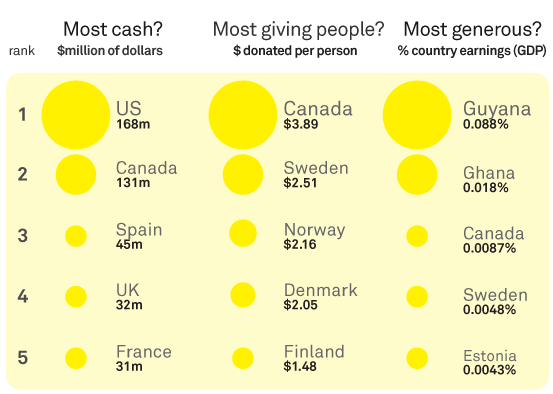You’ve got the power! Now exercise it by taking this week’s quiz on power-sharing, which we’re highlighting in this week’s Special Report: Power Sharing in Perspective.
[QUIZZIN 4]
You’ve got the power! Now exercise it by taking this week’s quiz on power-sharing, which we’re highlighting in this week’s Special Report: Power Sharing in Perspective.
[QUIZZIN 4]

The Haiti earthquake has become the new measure of generosity.
The country’s big northern neighbours have earned much praise for their effort: The US has pledged $168 million to date, and Canada $131 million. The bronze medal goes to Spain, with ‘only’ $45 million, although the latest data from ReliefWeb indicates that Saudi Arabia has caught up.
But data journalist David McCandless puts things into perspective: Measured as a percentage of GDP, the most generous countries in the Haiti crisis have been… Guyana and Ghana! Canada and all Nordic countries make it to the top ten in this wealth-corrected ranking as well, but not Uncle Sam.
Beyond its primary purpose of disaster relief, the donation campaign has lifted Haiti out of the realm of forgotten poverty-stricken nations. This is a chance for the country, but I am worried about two potential pitfalls.

This week the ISN explores the promises and pitfalls of power-sharing arrangements as they evolve from negotiation to implementation and functional reality.
This week’s Special Report contains the following content:

“During a crisis a woman can transform very quickly from being a politician to being a human being, and this can be bad”, Minko Gerdjikov, the deputy mayor of Sofia said in response to recent moves by the prime minister of Bulgaria to promote women to high-level positions in government and local administration, according to a New York Times article.
In a country known for its patriarchy and corruption, women, says the Prime Minister Boiko Borisov, are exactly what the country needs as “women are more diligent than men… are less corruptible than men… because they are more risk averse”. In an effort to clean his country’s act Borisov, an unlikely poster boy for the progressive forces in the country, has decided that it is exactly this ‘human’ characteristic that is required to overcome not only Bulgaria’s image problem, but also presumably its real problem of losing, rather embarrassingly, EU funds because of endemic and rampant graft.
To imply that being a ‘human being’ is somehow bad is a strange assertion not only because it implies that men are somehow less human and better off so, but because it implies that politics and ‘human values’ are incompatible. Politics in a lot of transitional countries are undoubtedly tough, but to categorically negate human values as components of successful and good politics is self-serving from the point of view of those who have a vested interest in the continuation of ‘business as usual’. Given the tendency for group-think and irrationality in crisis situations in particular, most often in male-dominated groups, should we not celebrate a more nuanced and independent form of deliberation that can come with the ‘human touch’, in women as well as men?
Even if women are more in touch with their humane side (buried deep in hardened male politicians), wired to perhaps see the world from a more communal point of view, does this bear out in the real world? Are women leaders any different when faced with the dilemmas of ruling the world’s countries, cities and communities? In other words, does the ‘X’ factor change anything?
Waste not, want not. And we want you to do well in this week’s quiz on e-waste! To learn more about the global challenge of e-waste, check out this week’s Special Report: E-Waste’s Toxic Trail.
[QUIZZIN 6]